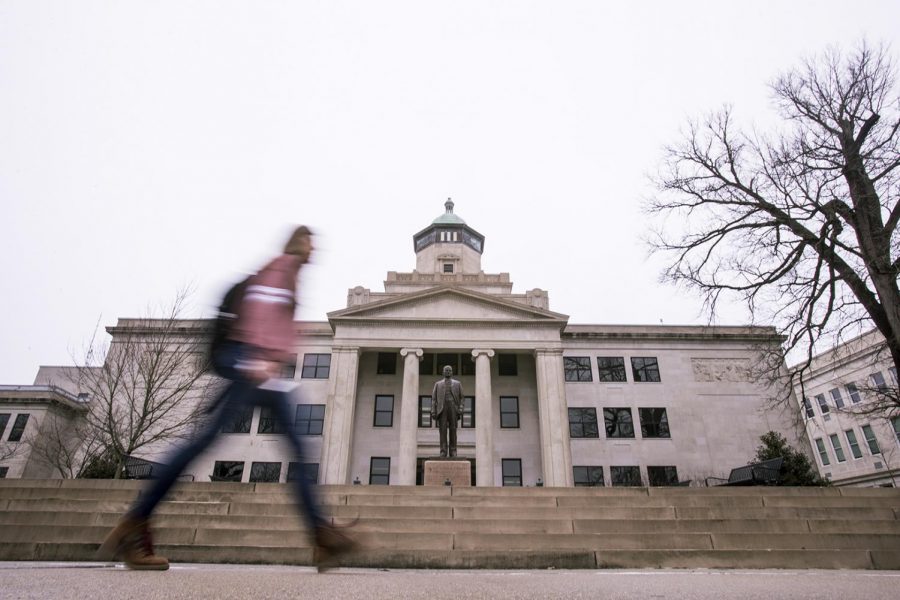Final CAPE recommendations sent to Board of Regents
April 9, 2019
The final recommendations from the Comprehensive Academic Program Evaluation process have been released, and 101 programs have been recommended for suspension.
Following former Provost Terry Ballman’s resignation, recommendations for CAPE have been directly passed to the Board of Regents for approval during the next Academic Affairs Committee meeting on Friday, April 12.
In an email sent to faculty and staff Monday, acting Provost Cheryl Stevens confirmed the CAPE Committee had completed its review of WKU’s 380 academic programs and will be ready to present its recommendations to the Board of Regents Committee.
Stevens said through CAPE, the committee has identified 209 programs to maintain as they currently are, 55 programs to transform, 15 programs to grow and 101 programs to suspend.
The suspended programs include 11 undergraduate degrees, four graduate degrees and 86 other credentials such as minors and certificates.
Of those 101 programs recommended for suspension, 42 have no enrollment, according to the Board of Regents agenda.
“Given a declining population of high school students, downturn in the number of international students, and reduced state allocations, we need to optimize allocation of scarce resources to promote and support growth,” Stevens said in the email.
Of the suspended programs, 36 came from Ogden College of Science and Engineering, 26 from Potter College of Arts and Letters, 23 from College of Health and Human Services, 15 from College of Education and Behavioral Sciences and one from Gordon Ford College of Business, according to agenda materials.
// <![CDATA[ // <![CDATA[ // &lt;![CDATA[ !function(){“use strict”;window.addEventListener(“message”,function(a){if(void 0!==a.data[“datawrapper-height”])for(var t in a.data[“datawrapper-height”]){var e=document.getElementById(“datawrapper-chart-“+t);e&amp;&amp;(e.style.height=a.data[“datawrapper-height”][t]+”px”)}})}(); // ]]&gt; // ]]> // ]]>
// <![CDATA[ // <![CDATA[ // &lt;![CDATA[ // &amp;lt;![CDATA[ // &amp;amp;lt;![CDATA[ // &amp;amp;amp;lt;![CDATA[ !function(){“use strict”;window.addEventListener(“message”,function(a){if(void 0!==a.data[“datawrapper-height”])for(var t in a.data[“datawrapper-height”]){var e=document.getElementById(“datawrapper-chart-“+t);e&amp;amp;amp;amp;&amp;amp;amp;amp;(e.style.height=a.data[“datawrapper-height”][t]+”px”)}})}(); // ]]&amp;amp;amp;gt; // ]]&amp;amp;gt; // ]]&amp;gt; // ]]&gt; // ]]> // ]]>
// <![CDATA[ // <![CDATA[ // &lt;![CDATA[ // &amp;lt;![CDATA[ // &amp;amp;lt;![CDATA[ // &amp;amp;amp;lt;![CDATA[ // &amp;amp;amp;amp;lt;![CDATA[ // &amp;amp;amp;amp;amp;lt;![CDATA[ // &amp;amp;amp;amp;amp;amp;lt;![CDATA[ // &amp;amp;amp;amp;amp;amp;amp;lt;![CDATA[ // &amp;amp;amp;amp;amp;amp;amp;amp;lt;![CDATA[ // &amp;amp;amp;amp;amp;amp;amp;amp;amp;lt;![CDATA[ // &amp;amp;amp;amp;amp;amp;amp;amp;amp;amp;lt;![CDATA[ // &amp;amp;amp;amp;amp;amp;amp;amp;amp;amp;amp;lt;![CDATA[ // &amp;amp;amp;amp;amp;amp;amp;amp;amp;amp;amp;amp;lt;![CDATA[ !function(){“use strict”;window.addEventListener(“message”,function(a){if(void 0!==a.data[“datawrapper-height”])for(var t in a.data[“datawrapper-height”]){var e=document.getElementById(“datawrapper-chart-“+t);e&amp;amp;amp;amp;amp;amp;amp;amp;amp;amp;amp;amp;amp;&amp;amp;amp;amp;amp;amp;amp;amp;amp;amp;amp;amp;amp;(e.style.height=a.data[“datawrapper-height”][t]+”px”)}})}(); // ]]&amp;amp;amp;amp;amp;amp;amp;amp;amp;amp;amp;amp;gt; // ]]&amp;amp;amp;amp;amp;amp;amp;amp;amp;amp;amp;gt; // ]]&amp;amp;amp;amp;amp;amp;amp;amp;amp;amp;gt; // ]]&amp;amp;amp;amp;amp;amp;amp;amp;amp;gt; // ]]&amp;amp;amp;amp;amp;amp;amp;amp;gt; // ]]&amp;amp;amp;amp;amp;amp;amp;gt; // ]]&amp;amp;amp;amp;amp;amp;gt; // ]]&amp;amp;amp;amp;amp;gt; // ]]&amp;amp;amp;amp;gt; // ]]&amp;amp;amp;gt; // ]]&amp;amp;gt; // ]]&amp;gt; // ]]&gt; // ]]> // ]]>
Initially, CAPE results were intended to go through a dean level, CAPE committee and provost recommendations before being presented to the Board of Regents.
On Friday, April 5, former Provost Terry Ballman announced she would be stepping down from her position, effective immediately. Following the announcement, President Timothy Caboni released a statement and said the CAPE process would skip the provost level of recommendations.
CAPE was initiated Aug. 29, 2018, in part with the strategic plan to “engage deans and department chairs in a comprehensive academic program review to ensure WKU has an appropriate mix of study options and efficiently deploys scarce resources,” according to the CAPE website.
During the process, tenured faculty positions will remain a priority. Teaching obligations may change, but WKU does not foresee a reduction in workforce, according to the website.
Through the review, all academic programs were evaluated on multiple levels and were classified as either “grow/enhance,” “maintain,” “transform” or “suspend.” In a February Board of Regents Committee meeting, Merrall Price, now interim dean of Potter College of Arts and Letters, explained “maintain” is for “robust, healthy” programs, which will include more than 50% of programs evaluated.
The second-largest group is “suspend,” and “transform” is for programs in need of “systemic change in a fundamental way” in order to better reflect what students need. “Grow/enhance” is for programs with more demand than supply, meaning there are not enough resources within the program to meet the quantity of students.
Deans and department heads were not required to release ongoing recommendations. The only college to release preliminary recommendations to the public was Potter College.
In her update on the CAPE process during the Board of Regents meeting, Price said not all faculty know the dean-level recommendations for their programs yet, as deans have taken different approaches to informing their departments.
One of the programs within Potter College recommended for suspension was the popular culture major.
Joseph Hoffswell, a professor who teaches several courses in the popular culture studies program, said when the initial CAPE recommendations were released to Potter College faculty and staff by former Dean Larry Snyder, he and others within the communication department appealed the recommendation to change popular culture to potentially “transform” or “maintain.”
Hoffswell reached out to alumni and wrote in the appeal how WKU’s popular culture major was a “difference maker” when it came to finding postgraduate jobs.
The appeal was denied.
WKU is one of two schools in the United States currently offering popular culture as a major, the other being Bowling Green State University in Bowling Green, Ohio.
“Since pop culture is interdisciplinary, we’ve had students come from broadcasting, music, art, folklore, communication, and the list goes on,” he said. “The purpose of the program is to be interdisciplinary, and none of those majors have been recommended for suspension. The classes won’t go, so I argued that the major shouldn’t go either.”
There are currently 12 students in the major. If the major is suspended, the only course that will no longer be taught is a senior seminar and independent study for students in the major. Other popular culture courses will continue to be offered as interdisciplinary and Colonnade courses.
News Editor Rebekah Alvey can be reached at 270-745-6011 and [email protected]. Follow Rebekah Alvey on Twitter at @bekah_alvey.
























